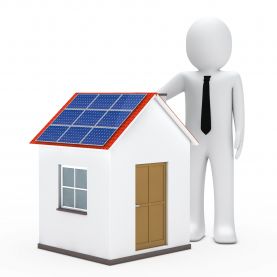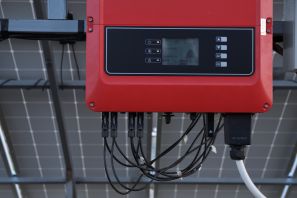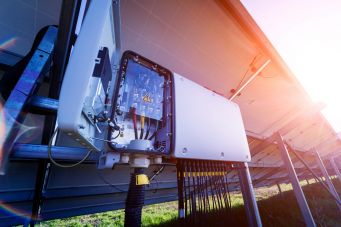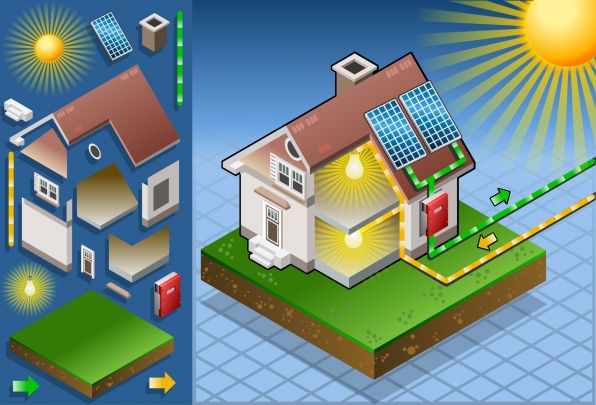Rooftop Solar Panel Kits | Residential Solar Panels – Solar Kits New Jersey
Why Solar Panel Kits?
Many people are interested in solar energy, but most of them have no idea where to start. In this post, we’ll explore the basics of rooftop solar panel kits for homes and how to compare different options.
The first question that comes to mind when considering solar energy is, why buy a kit? After all, you could get the equipment piece by piece from various suppliers. In reality, this is rarely a good idea for several reasons:
Uniformity
Solar energy systems are complex – even if you know how to install them, you could have mismatched panels and components that don’t add up to a whole picture. Without a kit, it’s unlikely that you’ll get identical types of equipment. One panel might be slightly different from the next, making the system work less efficiently than it should.

Ease
You can purchase a kit for your solar panels that includes the wiring, racking, and mounting hardware. Once you have these items together in one package, the installation will be much easier than if you were to piece it all together yourself.
Price
Purchasing a solar panel kit will almost always be cheaper than buying each item individually. You’ll save significant money when you opt for a package rather than shopping for components separately.
Installation
The entire process is more straightforward when you purchase a pre-assembled solar energy system. Most kits include everything required to create an energy-producing home with no outside wiring required. This will make setting up your rooftop solar panels much more accessible than if you opted to do it alone.
When should you (or shouldn’t you) buy a solar panel kit for your home?
There are a few things to consider when determining whether or not you should purchase a complete solar panel kit. First and foremost, if you choose this route, it’s essential to know whether your home is suitable for rooftop mount. If there isn’t an option for such placement due to other equipment on the roof (air conditioning units, vents), aesthetics, or any other reason, a kit might not be the most practical option.
If you have a large enough roof to accommodate solar panels and don’t have any issues with mounting equipment, purchasing a kit is one of the best ways for homeowners to go green with ease.
What does a standard solar kit installation include?

When you purchase kits for your solar panel, there are several components that you can expect to receive. These kits come with:
- Solar panels, which produce energy from the sun and feed it into your home’s electrical system
- Wiring and cables so that the energy can be transferred to the inverter for storage
- An inverter, which changes the DC electricity from the solar panels to AC for use in your home
- Racking and mounting hardware, which is used to hold the panels securely in place
- Safety equipment, such as grounding rods and other parts that help keep you safe during installation
If you don’t want to mount your panels on your roof, you can also purchase kits that feature ground-based equipment.
As you’re likely aware, not all kits are created equal. The following are some of the factors you should consider when comparing different options:
Company Reputation
Research the company that manufactures your chosen solar panels. Is it an established manufacturer, or are they relatively new to the industry? How many customers have reviewed their products online? Do you trust them and think they’ll be in business long enough to help with your warranty for years to come?
Warranty
Find out how long the warranty is on your system. What does it cover, and what is the process for getting a replacement if needed?
Component Quality
Does each of your system’s components have a long life expectancy, or will they need to be replaced within a few years? Some companies offer higher-quality equipment that could prove more cost-effective in the long run.
Inverters

Determine how many solar panel inverter your system contains. Will you need more than one? If so, make sure you purchase a kit that includes at least two. Keep in mind that some kits offer less expensive options; while more solar panels inverters might sound like a good idea, they can become counterproductive if one of them fails.
Pricing
The price of the unit is an obvious consideration when purchasing solar power kits for homes. More expensive doesn’t necessarily mean better, but it’s important to balance quality with affordability.
Energy Efficiency
A more efficient solar kit will cost a little more, but it could be worth the initial investment if you plan to keep your system for several years or longer. You’ll produce more power with fewer panels and enjoy a higher Return on Investment (ROI).
Financing
If you want to purchase a solar power system with little or no money down, you might want to choose one of the rooftop solar panel kits that come with financing options available.
Complete solar power kits for homes
In addition to the benefits of choosing a complete kit for your residential solar system, you’ll also have peace of mind knowing that your installation will be professional. The process is simplified and straightforward – you can have your panels up and running in a matter of days or weeks. Complete kits even come with warranties, so you know what you’re getting from day one.
DIY systems offer many of the same benefits, but they’re only recommended for homeowners with prior experience or who are willing to learn on their own. There are some components that you’ll need to have installed by a professional, so be sure to read the product description carefully before purchasing one of these units. Getting something you can’t use properly is a waste of money.
In addition to finding the best solar panels for your home, it’s essential to compare different financing options available. You might not have a large budget for a system, but there are plenty of incentives and rebates to take advantage of, so you don’t have to spend a lot upfront. If you’re worried about the solar panel cost, take some time to explore your options so you can get started with solar power in your home as soon as possible.

Grid-tie Solar Panel Kits
If you’re looking for a clean, simple way to charge your home’s battery bank and utilize solar power as a backup source of electricity during cloudy days or overnight hours, consider grid-tie solar panel kits.
A grid-tie system operates on the same lines as residential solar power systems – it uses panels to collect energy from the sun via photovoltaic cells – but it doesn’t utilize batteries for power storage. Instead, the energy collected from your solar panels is transferred directly to your home’s electrical system, where it can be used as needed.
Grid-tie solar panel kits are an excellent option for homeowners with a stable power source who want to add a bit of security while going green. These systems will keep your home powered up even if the grid goes out, and you can also feed excess energy back into the grid during sunny hours.
Off-Grid Solar Panel Kits
There are some perks to going completely off-grid with your solar power system. If you’re not interested in having a connection to the local utility grid, you can choose an off-grid solar kit that will provide all the energy your home needs during sunny days and cloudy weather alike.
Off-grid kits solar panels are also more expensive than grid-tie options because of the battery backup system they require. If you’re ready to take your off-grid solar energy system to the next level, consider hiring a professional to design and install your very own custom off-grid kit.
DIY solar kits home use
If you want to save money on your solar energy bill but don’t want the hassle of hiring a professional for installation, consider giving DIY solar PV panels for home use a try. These kits are designed with homeowners in mind so that anyone can install them in their backyard or garden area. You’ll have to do some manual labor and provide your tools, but this is a great way to get started with solar power in your home without spending a fortune.
Why Choose DIY Solar for Your Home?
DIY solar panels can be a great way to save money on your electricity bill without the hassle of hiring a professional for installation.
With this option, you can save thousands on installation fees that would otherwise be put towards hiring a professional. You will need to provide all of your tools and do some manual work to install the panels in your yard, at least initially.
Though this is not necessarily easy or quick, it can be enriching. While you will need to do some manual labor, you can also take pride in completing this project using only your resources.
What to Look for in a DIY Solar Panel Kit
There’s no shortage of solar products on the market, and not all kits are made equal. You’ll need to do some research before choosing a product that best suits your needs – especially if you’re going with a DIY kit.
Consider price, durability, ease of installation, and power output when you’re comparing DIY solar kits for home use. You can even get a jump start on your research by talking with friends and family members who have already installed their systems.
How much does it cost to build your own solar panel?
With the rising costs of electricity, more and more people are choosing to invest in solar panels. Not only do you get free electricity for up to 25 years, but the value of your home may go up. But what if you don’t want to spend thousands of dollars on an expensive solar system? You could always build your own solar panel. You not only get to save money, but you also get the satisfaction of building something yourself.
A solar panel system for your house will cost about $15,000 – $25,000. Most people don’t want to pay that much for a solar panel system though. So instead, they buy one online and have it shipped to their home. Then they hire a solar panel installer to set the system up and add it to their electric grid.
A 400 watt solar panel system will only cost around $700 – $1,000. The smallest solar panel system you can buy is 100 watt and that system will cost you about $300.00. A portable solar kit with a battery and inverter will cost you around $100 – $300.
Portable solar kits are great if you want to go camping, boating, hiking, or even on a long-term survival trip. Yet the bigger wattage systems with higher price tags are more suitable for those who just want to reduce their energy bill each month. So basically, the smaller the system is, the cheaper it’ll be and the bigger it is, the more it’ll cost you.
Who Should Buy DIY Solar Panel Kits?
If you’re comfortable with a bit of DIY work and have the time to invest in your solar system, then a DIY kit might be suitable for you. You’ll save on installation fees, but you’ll need to provide all your tools and do some manual labor.
Here’s a list of who can benefit from installing their solar panels:
- People looking to save money on electric bills
- Homeowners with some DIY experience and plenty of time to spare
- Anyone looking for an exciting project that will provide them with long-term benefits like reduced power consumption and cost
- Anyone motivated to install a solar panel system on their own
- People with a favorable roof orientation for solar panels (south-facing or west-facing, for example)
Is it better to buy a complete solar panel system or just the components to assemble it yourself?
This is a common question from people interested in installing solar panels. And it depends on your preferences and needs.
The manufacturer’s suggested retail price ( MSRP sale price ) for solar cells is used by many solar cell customers to decide how much they are willing to pay for the number of watts they want to buy. This practice has led some people to assume that the cost of a solar panel is determined solely by the price the manufacturer charges.
The price offered by manufacturers includes certain costs that are not required for off-grid solar panel systems that don’t sell electricity back into the grid. The manufacturer’s price includes inverters, lugs, and other components needed for grid-tie systems, as well as profit margins on the overall cost of a solar panel.
If you’re more comfortable with the idea of purchasing a complete solar system, then a pre-assembled kits solar panel might be suitable for you because these products do come with everything you need to get started. They typically come with inverters, charge controllers, mounting brackets, wiring, and cabling. They often come with pre-selected solar panels, so there’s no need to buy the individual components yourself.
However, if you want more control over your system components, then purchasing each part might be a better way to go. Not only will you have more options for your components, but with individual components, you won’t need to wait several days to receive all the parts of a pre-assembled kit before installing it.
The important thing is that both are viable options for solar panels available today, so be sure to compare each type before making your selection.
